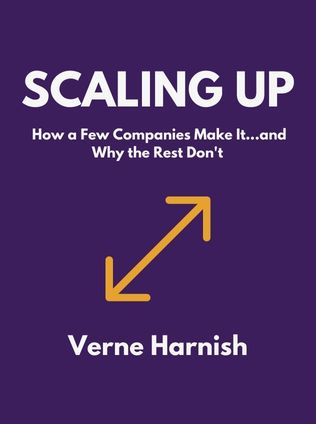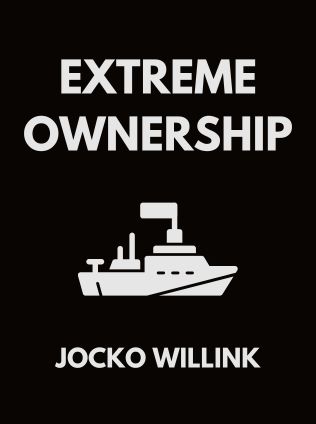
Scaling Up
How a Few Companies Make It...and Why the Rest Don't (Rockefeller Habits 2.0 Revised Edition)
By Verne Harnish
Published 10/2014
About the Author
Verne Harnish, a prominent figure in the field of business growth, has dedicated over 30 years to helping executives successfully scale their companies. As the founder and CEO of Scaling Up, a global executive education and coaching company, Harnish has guided thousands of business leaders across six continents. His work, including seminars, summits, and books, provides practical insights into the challenges and strategies involved in expanding a business from a small operation into a major industry player. Harnish's expertise is deeply rooted in strategic thinking, leadership, and the nuances of sustainable growth.
Main Idea
"Scaling Up" by Verne Harnish is a comprehensive guide designed for business leaders who aspire to grow their companies into industry leaders. The book emphasizes the importance of having a clear vision, crafting a strategic plan, and building a strong team to navigate the complexities of scaling a business. Harnish outlines actionable steps that include defining a compelling vision, articulating core values, identifying unique strengths, and implementing strategies that drive sustainable growth. This book serves as a roadmap for leaders committed to taking their businesses to new heights.
Table of Contents
- Articulate Your Vision
- Articulate Your Values
- Find Your Points of Excellence
- Strategy: Put Your Vision Into Action
- Form a Strategic Thinking Group
- Adapt to Changing Circumstances
- Evolve the Structure
- Move Beyond the Founder
- Build Your Team
- Ensure Implementation
Articulate Your Vision
At the heart of "Scaling Up" is the concept of a clear and compelling vision. Harnish asserts that a vision is more than just a goal; it is the foundation that guides all business activities. A well-defined vision provides direction, purpose, and a sense of identity for a company. It is the ultimate destination the company aims to reach, influencing every decision and strategy along the way.
Harnish emphasizes that a vision must be specific and actionable. For instance, a technology company might aim to become the leading provider of AI-driven healthcare solutions. This vision would then shape the company’s product development, marketing strategies, and hiring practices. A vision like this aligns the entire organization and ensures that every action taken is in service of achieving this ultimate goal.
Harnish highlights the importance of aligning the entire organization with the vision. He references a study by EY and Harvard Business School, which found that companies with a strong sense of purpose are more likely to succeed in the long term. However, only 46% of executives surveyed said their business operates with a clear vision and purpose, underscoring the importance of effectively articulating and communicating the company’s vision.
Tim Ferriss, author of "The 4-Hour Workweek," echoes this sentiment, arguing that business growth must be rooted in a specific and well-defined vision. Ferriss notes that vague aspirations are insufficient; companies must envision a concrete future state that provides clarity and focus, motivating employees by giving them a clear understanding of their role in achieving the company’s goals.
Articulate Your Values
While a vision sets the direction, values provide the ethical and moral compass that guides how a company operates. Harnish emphasizes that a company’s values are the principles that define its culture, influence decision-making, and shape interactions with customers, employees, and stakeholders.
Values must be lived and practiced by everyone in the organization. For example, a company that values customer service ensures that every employee prioritizes customer satisfaction in every interaction. This value influences product design, service delivery, and employee training. Harnish argues that a company’s values must be deeply embedded in its culture, engaging employees at all levels to ensure these values resonate throughout the organization.
Harnish also highlights the importance of storytelling in articulating a company’s values. The story of a company is not just about its founding but about its purpose, mission, and the impact it seeks to have on the world. This narrative should inspire employees, attract customers, and differentiate the company from its competitors. For instance, Patagonia’s commitment to environmental sustainability is a core value that shapes every aspect of its operations, from product design to marketing campaigns.
Find Your Points of Excellence
Harnish stresses the importance of identifying and leveraging a company’s points of excellence—unique strengths that set it apart from competitors and create value for customers. These could include proprietary technology, innovative processes, or a distinctive brand identity.
Sign up for FREE and get access to 1,400+ books summaries.
You May Also Like
The Lean Startup
How Today's Entrepreneurs Use Continuous Innovation to Create Radically Successful Businesses
By Eric RiesWho Moved My Cheese?
An Amazing Way to Deal with Change in Your Work and in Your Life
By Spencer Johnson, M.D.Make Your Bed
Little Things That Can Change Your Life...And Maybe the World
By William H. McRavenThe Ride of a Lifetime
Lessons Learned from 15 Years as CEO of the Walt Disney Company
By Robert IgerThe Hard Thing About Hard Things
Building a Business When There Are No Easy Answers
By Ben Horowitz



















